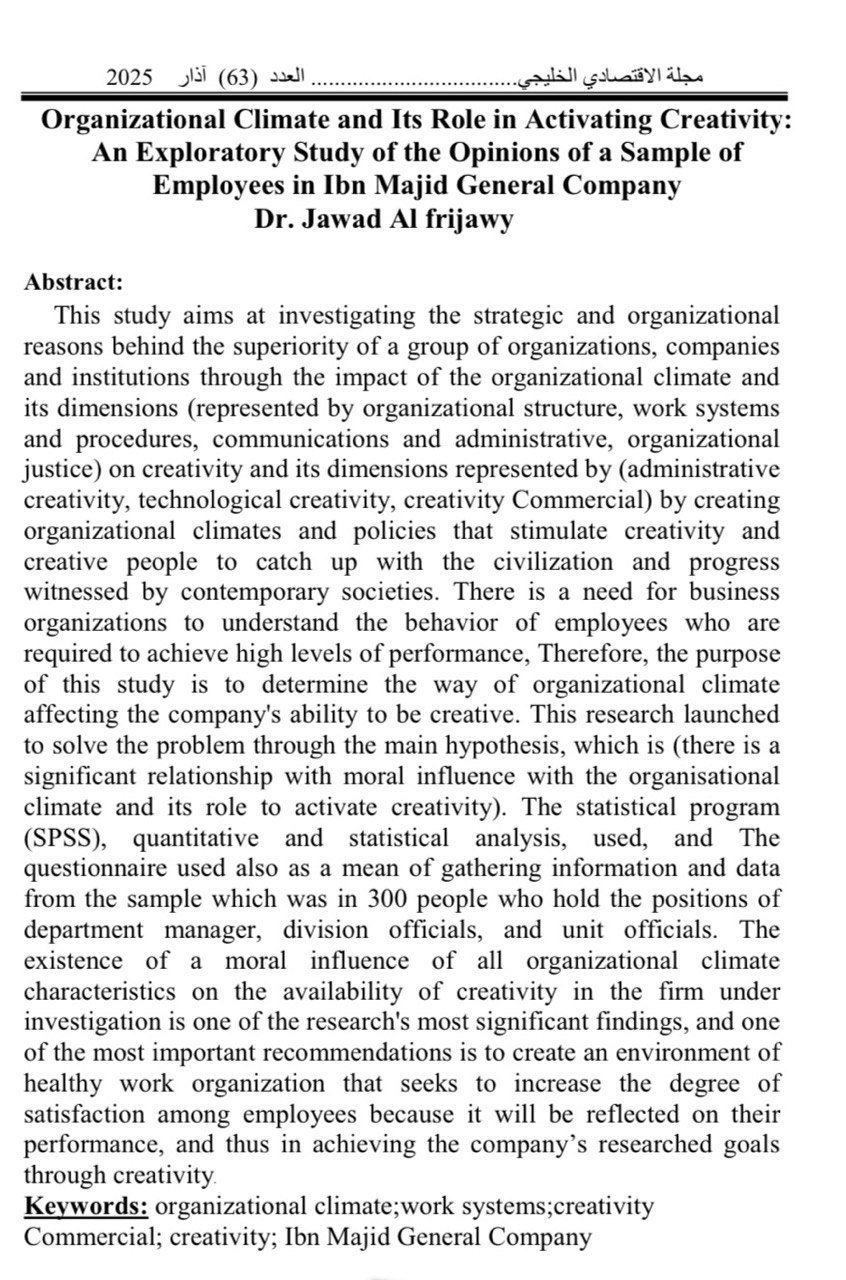Organizational Climate and Its Role in Activating Creativity: An Exploratory Study of the Opinions of a Sample of Employees in Ibn Majid General Company
Main Article Content
Abstract
This study aims at investigating the strategic and organizational reasons behind the superiority of a group of organizations, companies and institutions through the impact of the organizational climate and its dimensions (represented by organizational structure, work systems and procedures, communications and administrative, organizational justice) on creativity and its dimensions represented by (administrative creativity, technological creativity, creativity Commercial) by creating organizational climates and policies that stimulate creativity and creative people to catch up with the civilization and progress witnessed by contemporary societies. There is a need for business organizations to understand the behavior of employees who are required to achieve high levels of performance, Therefore, the purpose of this study is to determine the way of organizational climate affecting the company's ability to be creative. This research launched to solve the problem through the main hypothesis, which is (there is a significant relationship with moral influence with the organisational climate and its role to activate creativity). The statistical program (SPSS), quantitative and statistical analysis, used, and The questionnaire used also as a mean of gathering information and data from the sample which was in 300 people who hold the positions of department manager, division officials, and unit officials. The existence of a moral influence of all organizational climate characteristics on the availability of creativity in the firm under investigation is one of the research's most significant findings, and one of the most important recommendations is to create an environment of healthy work organization that seeks to increase the degree of satisfaction among employees because it will be reflected on their performance, and thus in achieving the company’s researched goals through creativity.
Article Details

This work is licensed under a Creative Commons Attribution-ShareAlike 4.0 International License.
References
Berberoglu, A. (2018). Impact of organizational climate on organizational commitment and perceived organizational performance: empirical evidence from public hospitals. BMC health services research, 18, 1-9.
Dalton, J. T., & Logan, A. J. (2022). The Man Who Discovered Capitalism: A documentary on Schumpeter for use in the classroom. International Review of Economics Education, 41, 100250.
Fortwengel, J., Schüßler, E., & Sydow, J. (2017). Studying organizational creativity as process: Fluidity or duality? Creativity and Innovation Management, 26(1), 5-16.
Gupta, V., & Singh, S. (2015). Leadership and creative performance behaviors in R&D laboratories: Examining the mediating role of justice perceptions. Journal of Leadership & Organizational Studies, 22(1), 21-36.
Hecklau, F., Galeitzke, M., Flachs, S., & Kohl, H. (2016). Holistic approach for human resource management in Industry 4.0. Procedia Cirp, 54, 1-6.
Hofmann, D. A., Burke, M. J., & Zohar, D. (2017). 100 years of occupational safety research: From basic protections and work analysis to a multilevel view of workplace safety and risk. Journal of applied psychology, 102(3), 375.
Hon, A. H., & Lui, S. S. (2016). Employee creativity and innovation in organizations: Review, integration, and future directions for hospitality research. International Journal of Contemporary Hospitality Management, 28(5), 862-885.
Lau, K. W. (2016). Understanding creativity competency for organizational learning: A study of employees’ assumptions on creativity competency in creative industry. Journal of Management Development, 35(10), 1198-1218.
Mohsin, H. J., Hani, L. Y. B., Bani Atta, A. A., Al-Alawnh, N. A. K., Ahmad, A. B., & Samara, H. H. (2023). The impact of digital financial technologies on the development of entrepreneurship: Evidence from commercial banks in the emerging markets [Special issue]. Corporate & Business Strategy Review, 4(2), 304–312. https://doi.org/10.22495/cbsrv4i2siart10
Moon, K. K. (2017). Fairness at the organizational level: Examining the effect of organizational justice climate on collective turnover rates and organizational performance. Public Personnel Management, 46(2), 118-143.
Nazir, S., Qun, W., Hui, L., & Shafi, A. (2018). Influence of social exchange relationships on affective commitment and innovative behavior: Role of perceived organizational support. Sustainability, 10(12), 4418.
Omotayo, F. O. (2015). Knowledge Management as an important tool in Organisational Management: A Review of Literature. Library Philosophy and Practice, 1(2015), 1-23.
Parke, M. R., & Seo, M. G. (2017). The role of affect climate in organizational effectiveness. Academy of Management Review, 42(2), 334-360.
Rus, A., & Orel, M. (2015). Coworking: a community of work. Teorija in Praksa, 52(6), 1017-1038.
Sarooghi, H., Libaers, D., & Burkemper, A. (2015). Examining the relationship between creativity and innovation: A meta-analysis of organizational, cultural, and environmental factors. Journal of business venturing, 30(5), 714-731.
Sarooghi, H., Libaers, D., & Burkemper, A. (2015). Examining the relationship between creativity and innovation: A meta-analysis of organizational, cultural, and environmental factors. Journal of business venturing, 30(5), 714-731.
Sloane, P. (2017). The leader's guide to lateral thinking skills: unlock the creativity and innovation in you and your team. Kogan Page Publishers.
Sokol, A., Gozdek, A., Figurska, I., & Blaskova, M. (2015). Organizational climate of higher education institutions and its implications for the development of creativity. Procedia-Social and Behavioral Sciences, 182, 279-288.
Tàbara, J. D. (2023). Regenerative sustainability. A relational model of possibilities for the emergence of positive tipping points. Environmental Sociology, 9(4), 366-385.
Williams, T. A., Gruber, D. A., Sutcliffe, K. M., Shepherd, D. A., & Zhao, E. Y. (2017). Organizational response to adversity: Fusing crisis management and resilience research streams. Academy of management annals, 11(2), 733-769.
Zhou, J., Wang, X. M., Bavato, D., Tasselli, S., & Wu, J. (2019). Understanding the receiving side of creativity: A multidisciplinary review and implications for management research. Journal of management, 45(6), 2570-2595.
